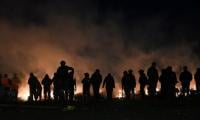Beyond Panama
Long before the Bahamas and Panama leaks, many cases of unlawful capital outflows, tax avoidance and corruption by public officeholders and others were cited in these columns. However, NAB, ECP, the election tribunal, SBP, FBR, FIA and provincial anti-corruption departments, as expected, chose to look the other way. Till today, no effort has been made by these agencies to form joint investigation teams for probing allegations levelled in these and other leaks.
All over the world, the main issue arising from the Panama Papers is lack of moral standards for those who represent people and hold public office. They cannot and should not hide their financial matters behind the laws of secrecy and privileges. In this context, it is necessary for all the elected representatives, not the prime minister alone, to come forthwith and make public sources funding their life of luxury.
Most of the elected members have a fleet of expensive cars (besides using official ones) and palatial bungalows. These are either not shown in their asset declarations or claimed to have been received as gifts in declarations filed before the ECP. Many elected representatives have armies of servants and guards. They must tell the public who donates the gifts that fund their luxuries. Such donors must not be doing all that as charity.
Many members own huge agricultural lands and have investments in industrial units like sugar, textile and paper mills. Many have properties outside Pakistan. Any elected member who is beneficiary of ‘wealth’ and ‘gifts’ from family members or friends at home or abroad must explain the sources and modes of these ‘financial favours’. This is required by various laws like the Representation of People Act, 1976 and Income Tax Ordinance, 2001.
In the wake of the Panama Papers, the assets of politicians, generals, judges and high-ranking civil officers should be made public on priority basis vis-à-vis their tax declarations. The apex court should also summon the chairpersons of NAB and FBR, director general of the FIA, governor of the SBP etc to explain the inefficiency of their organisations in countering unlawful outflows/inflows, tax evasion and corruption.
The determination of the quantum of black money, rent-seeking and tax evasion is a daunting task. It is an incontrovertible fact that Pakistan is a unique case where the state, instead of combating corruption, sponsors and patronises all kinds of undesirable practices. Pakistan is a victim of reverse capital flows and capital flights due to policies of appeasement by successive governments towards criminals and the corrupt.
The ultimate cynicism that afflicts a society is acceptance of corruption as a way of life. Unfortunately, after seven decades of independence, this is precisely where we have reached. Pakistan cannot progress unless foundations of corruption and rent-seeking are destroyed. For this it is necessary to forfeit all benami (untaxed/undeclared) assets in favour of the state. Immunities and amnesties for criminals, plunderers of the national wealth and tax evaders must be abandoned without any further delay.
The majority of the members of parliament have declared shamelessly low incomes as evident from the tax directories for 2013, 2014 and 2015 published by FBR. The elected members, politicians, public officeholders, bureaucrats, generals and judges should be investigated by an independent commission, comprising experts and men of impeachable integrity, as to ownership of their assets (in own name, family, relative and benami) and style of living vis-à-vis their declared incomes.
This process alone will ensure true accountability in Pakistan. Once the rich and mighty are taken to task, all citizens will obey the laws and pay their taxes honestly and diligently.
The writer is an advocate of the Supreme Court and
adjunct faculty at LUMS.
Twitter: @drikramulhaq
-
 'Bridgerton' Season 4: Showrunner Talks About Violet's Steamy Romance
'Bridgerton' Season 4: Showrunner Talks About Violet's Steamy Romance -
 John Tesh Recalls ‘uncomfortable’ Backlash Over ’70s Romance With Oprah Winfrey
John Tesh Recalls ‘uncomfortable’ Backlash Over ’70s Romance With Oprah Winfrey -
 Meghan Markle, Prince Harry Problem Was Not ‘work’ During Time With Royals
Meghan Markle, Prince Harry Problem Was Not ‘work’ During Time With Royals -
 Meta Strikes Multi-billion-dollar AI Chip Deal With Google: Will The New Collaboration Pay Off?
Meta Strikes Multi-billion-dollar AI Chip Deal With Google: Will The New Collaboration Pay Off? -
 Gracie Abrams Breaks Silence After Losing 2026 BRIT Award
Gracie Abrams Breaks Silence After Losing 2026 BRIT Award -
 Deon Cole Takes Swipe At Nicki Minaj In Mock Prayer During NAACP Image Awards Monologue
Deon Cole Takes Swipe At Nicki Minaj In Mock Prayer During NAACP Image Awards Monologue -
 Jennifer Garner Reveals The Actress Who 'carried Through Things'
Jennifer Garner Reveals The Actress Who 'carried Through Things' -
 Shamed Andrew ‘awful’ Time As Trade Envoy Is Laid Bare By Insider
Shamed Andrew ‘awful’ Time As Trade Envoy Is Laid Bare By Insider -
 Belgium Seizes Suspected Russian Shadow Fleet Tanker
Belgium Seizes Suspected Russian Shadow Fleet Tanker -
 Liza Minelli Makes Bombshell Claim About Late Mother Judy Garland’s Struggle With Drugs
Liza Minelli Makes Bombshell Claim About Late Mother Judy Garland’s Struggle With Drugs -
 Shipping Giant Maersk Halts Suez Canal, Bab El-Mandeb Sailings Amid Escalating Conflict
Shipping Giant Maersk Halts Suez Canal, Bab El-Mandeb Sailings Amid Escalating Conflict -
 Matthew McCoughaney Reveals One 'gift' He Achieved With Losing Nearly 50 Pounds
Matthew McCoughaney Reveals One 'gift' He Achieved With Losing Nearly 50 Pounds -
 'Scream 7' Breaks Box Office Record Of Slasher Franchise: 'We Are Grateful'
'Scream 7' Breaks Box Office Record Of Slasher Franchise: 'We Are Grateful' -
 Bolivian Military Plane Crash Death Toll Rises To 20
Bolivian Military Plane Crash Death Toll Rises To 20 -
 'Sinners' Star Blasts Major Media Company For 2026 BAFTAs Incident
'Sinners' Star Blasts Major Media Company For 2026 BAFTAs Incident -
 Inside Scooter Braun, Sydney Sweeney's Plans To Settle Down, Have A Baby
Inside Scooter Braun, Sydney Sweeney's Plans To Settle Down, Have A Baby



